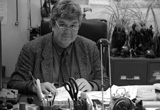 Robin Williams’s recent death is a familiar shock: another premature loss of a publicly loved figure. How do we understand and respond to such tragic discrepancy?
Robin Williams’s recent death is a familiar shock: another premature loss of a publicly loved figure. How do we understand and respond to such tragic discrepancy?
On the radio (BBC’s Today programme on Radio 4, 15/8/2014) there were lengthy interviews with two publicly accountable experts: the director of long term conditions for NHS England and the president of the Royal College of Psychiatrists. The interviewer asked whether we could “diagnose” and “treat” psychiatric conditions with greater speed and effectiveness—breast lumps were used as an analogy. All three thought that they could comfort one another and the rest of us with assurances: yes, with better science, systems, and training our interception and outcomes are bound to improve.
But the language used indicates a fallacy, and that fallacy will stymie our efforts. The fallacy is that we can deal with the bulk of distressed human experience as if “it” is a medical condition: diagnosis, treatment, and cure. But, as the suicide of Robin Williams has so poignantly shown, our distress often cannot be directly understood or influenced, let alone dispelled or resolved.
We are (for the most part) complex, chimeric, encoded, and paradoxical creatures. We are blessed and cursed with self-consciousness, sentience of mortality, existential questions, and our disguises for all these. Within our rational scaffolding, we swirl with powerful internal gusts portending violence, disintegration, insanity, and entropy. Secretly, we know this from our dreams. But more publicly, our media shows us with horrific clarity what we can trigger—what lies beneath.
Can “expertly” designed approaches help our endlessly generated internal maelstroms? In my view, the experts’ recommendations of more standardised diagnoses and treatments are mostly doomed. This is because such approaches usually cannot engage with the encrypted and chimeric nature of human struggles: our unformulatable human variation.
I have worked for several decades as a frontline NHS psychiatrist and GP. During this time, I have developed a limited respect and a wider scepticism for the medicalisation (and thus often medication) of complex human distress. Early on, I realised that often our best offerings for patients comes in the provision of patient, imaginative, and skilled personal understanding, with guidance, comfort, and containment.
What I offer is often partially helpful, but it is rarely a “solution” or a “cure.” No, I cannot remove someone else’s unhappiness—even when it crystallises—as if it were a breast lump. I hope that my best efforts are therapeutic, but I do not package them. I do not call them treatments. This is because, ultimately, we each have responsibility for our own meaning, peace, and re-equilibration. Yes, we all have responsibilities to support and encourage one another in these lifelong tasks: this is a deeper meaning for our words community or society.
Robin Williams’s celebrity suicide provides dark glitter for a brief cluster of headlines. Behind these is private knowledge and grief known to very few. Far beyond that, lie our hidden pains, struggles, and conundrums—the man behind the mask, the unspoken behind the many voices. Robin Williams’s life and death evoke the tragic possibilities in us all. The perennially high suicide rate among psychiatrists is another chilling example.
Can we avoid such human loss by increasing our mass production of centrally trained and sharply managed GPs, psychiatrists, or cognitive behavioural therapists? I doubt it. This is the most difficult and humbling of human work: we need to extend our vocabulary and repertoire far beyond “diagnosis” and “treatment.” We have to extend our human heart and imagination: first in ourselves, then to others. All this is of course personally taxing, yet sometimes deeply rewarding. The paths are often long, treacherous, and shrouded in mist. Along the way there are many guides—some are quiet and wise, some seem too fluently confident—yet all are fallible.
Sometimes we may be grateful, but always we must be wary.
David Zigmond is a GP in London.
Competing interests: I declare that I have read and understood the BMJ policy on declaration of interests and I have no relevant interests to declare.
